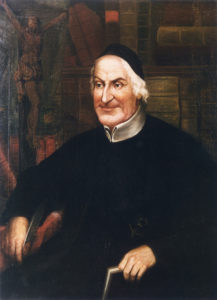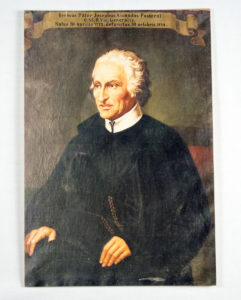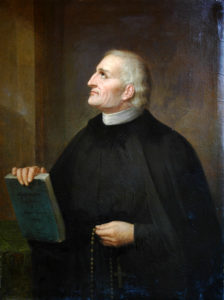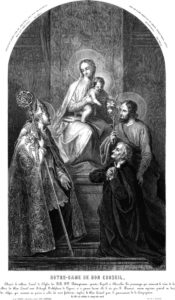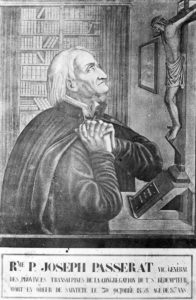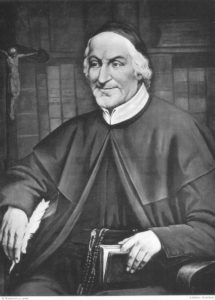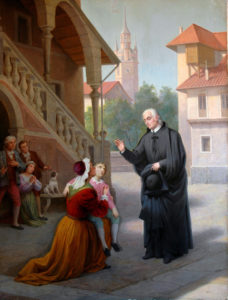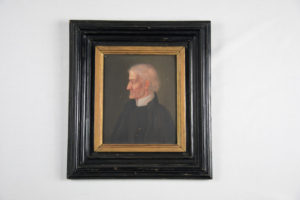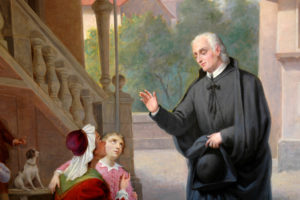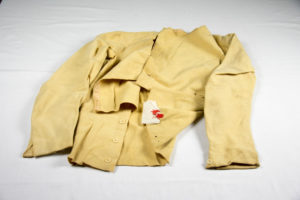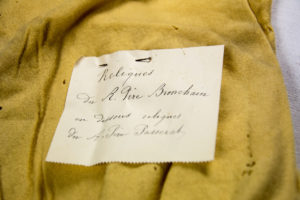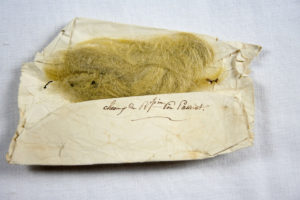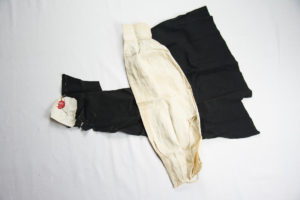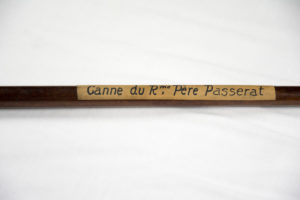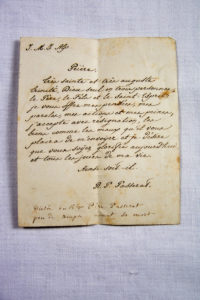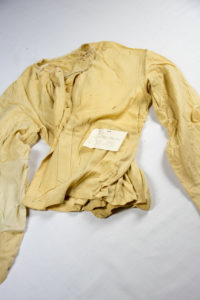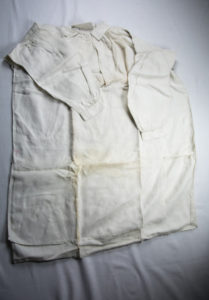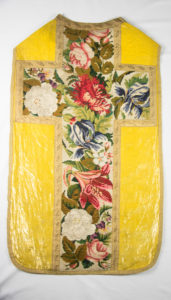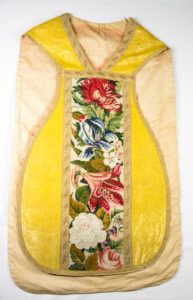Great promoter of the Redemptorist Congregation
See the video
>You can find the subtitles in your language next to the YouTube player controls.
Listen
Read
The Presence of Christ in the Community – Roots –
Great promoter of the Redemptorist Congregation – Father Joseph Passerat
It seemed as if the Benonite monastery was closed, the difficulties in Vienna and the subsequent death of St. Clement Hofbauer crossed the fate of the Redemptorist from the northern part of the Alps. Nothing could be more wrong. The one who undoubtedly contributed to the development of the Congregation of the Most Holy Redeemer, was an unusual religious man, a Redemptorist whose beatification process is currently in progress. Saint Clement esteemed him very much. He saw him as his successor. Shortly before his death, St. Clement gathered future candidates for the Congregation and said to them: “Comfort, my children, you now have a teacher so imperfect, but when are done, I will send you a great Frenchman who will teach you how to pray. If you do not become saints by his example, you will never become saints. ”
Who was the Great Frenchman that Saint Clement Hofbauer wrote about? It was Father Joseph Passerat. Currently he is a venerable servant of God. Some called him “the great praying man”. However, he was not a man who only contemplated God, but he was a man who changed prayer into action. Because of him, the Redemptorists were so dynamic developing in the first half of the nineteenth century. At that time, numerous monasteries were founded in Austria, Switzerland, Bavaria, Belgium, France, Romania and the United States.
Let us get to know the story of this unusual religious Redemptorist, Father Joseph Passerat. He was born on April 30, 1772 in Joinville, France. We know very little about the childhood of Joseph Passerat. It was said that from an early age he expressed a desire to become a priest. Young Joseph began his education in the abbey of St. Urban, where the Benedictines ran a school for male youth. At the age of 16 he joined a lower seminary run by Lazarists. After completing primary education, Joseph Passerat wanted to continue his studies at the Paris Seminary. Unfortunately, the French Revolution that broke out in 1789 crossed his plans. All the seminaries were closed. Priests were forced to swear an oath on the civil constitution of the clergy, it causes rapture their unity with the Holy See. In France. A time of persecution and martyrdom began for the Church there.
The desire to become a priest in young Joseph Passerat was very strong. However, he could not agree with the situation of the Revolution. So, he looked for a priest who could prepare him for the priesthood by teaching him philosophy and theology. He wanted a man who was loyal to the Holy See, and not to swear an oath on the constitution. This light of hope turned out to be a young priest from the family of Joinville who agreed to teach young Passerat. Unfortunately, in 1792 France declared war on Austria. European countries did not agree with the views of the French revolutionaries. France announced army mobilizations. Joseph Passerat was called to serve in the army. Once again, his dream of priesthood was delayed. He was assigned to a military orchestra. Due to his height, he quickly caught the attention of the officers, who appointed him the chief quartermaster. He was responsible for organizing army stops. Joseph Passerat felt internally that this was not his place, that this was not the place where God was calling him. Therefore, during the organization of one of the army’s stops in Bitche in Lorraine, he escaped the army.
Joseph Passerat could continue his path to the priesthood again. However, he had to do it very carefully and in secret. Let us remember that he was now a deserter. He decided to go to Belgium, where French was spoken. There he wanted to finish studies and be ordained. These plans were interrupted very quickly because he encountered French troops there. For fear of being drafted back into the army, he ran to another place in Lüttich, but he could not stay there either. The only place he could go was Germany. However, he knew neither the language nor the customs there. The desire of priesthood was growing. Finally, he joined to the Seminary in Trier. This place proved to be inappropriate for him. This time not by the French army, but by the heretical views of professors who proclaim Febronius’s teaching. This situation forced Joseph Passerat to leave the seminary.
Joseph Passerat found out that in nearby Augsburg there are still orthodox professors. Ex-Jesuits who taught orthodox Catholic teaching. This place proved to be beneficial. He was there for two years. His stay there ended with the lower ordination he got. It was probably there that was introduced to the teaching of St. Alphonsus Liguori, the founder of the Redemptorists. At that time, the seminary for French seminarians was established in Wurzburg. He was there only for a few months.
We do not know how he got to know about the activities of St. Clement Hofbauer in Warsaw. Was it from the ex-Jesuit from Augsburg or was it his stay at the Wurzburg seminary? We do not know that. One thing is sure – at the beginning of 1796, together with three French seminarians, he knocked on the monastery gate of the Warsaw Redemptorists. At that time, the supervisor there was St. Clement. The Redemptorists received French candidates willingly. There were many emigrants from France in Warsaw that could serve as future priests.
In this way Joseph Passerat joined the Redemptorist Congregation. Very soon, after a six-month novitiate, our French confreres made profession on November 13, 1796. On April 15, 1797, Passerat’s childhood dream came true. He was ordained and became a priest. He started to work very quickly. A year after ordination, he became a master of the novitiate, the person responsible for educating candidates for the Congregation. He also taught young seminarians, moral theology and dogmatic theology. Due to language difficulties – he spoke little German and Polish – he did not preach too much. However, he was a highly respected confessor.
Saint Clement took care of the development of the Congregation. He made many attempts to found new monasteries in today’s Germany, in Austria and Switzerland. In 1802, a new Redemptorist monastery was established on Mount Tabor in Jestetten. Father Joseph Passerat became the superior of this community. Despite the difficult housing condition, living almost in poverty, Father Joseph and his confreres began their pastoral work there. The Redemptorists took care of the pilgrimage church in Triberg. Unfortunately, zealous work of the Redemptorists and the great trust, given them by believers, did not please the authorities at that time. They were called religious fanatics and their situation was unsure. Expelled from Triberg, the Redemptorists with Father Passerat went to Babenhausen. Despite many difficulties and miserable lives, the religious were not discouraged but trusted in God. The special testimony of St. Clement and Father Passerat are the words of the parish priest of Weinried: “give me four Hofbauers for the pulpit and four Passerats to the confessional, and I will convert all kingdoms.” This testimony characterizes the Redemptorist of that time, zealous and still present among people.
The period from 1807 to 1820 was a time in the life of Father Joseph Paseratt, which could by characterized by constant anxiety about his confreres and the founded monasteries. Redemptorist were constantly exiling from one place to another. They set up a monastery in Chur and in Visp in Switzerland. They also had to leave these places. Their zealous work and great trust given them by people were difficult for the Enlightenment streams, for which religion was of no use, a superstition. Despite these difficulties, Father Passerat still trusted in God and looked for a new place where he could found a community. He found a safe place in Freiburg. Unfortunately, only seminarians could be in the monastery. However, the Fathers were placed around the neighbouring towns, where they started working as parish priests or vicars. Joseph Passerat became a pastor in a small town, about 15 km from Friborg. Despite often being away, he took care of the formation of his confreres. He gathered them around him for prayer, organized ascetic conferences for them, and precisely took care of their keeping of vows, especially the vow of poverty. He earned great trust and recognition from the local clergy. Nuncio even promoted him to be a bishop, but this plan was opposed by St. Clement, saying, “You cannot take children away from their mother”.
1818 proved to be lucky for the Redemptorists. Thanks to the kindness of the local bishop and local authorities, they received permission to found a monastery in the hermitage of Valsainte. From that time, Father Joseph Passerat and his confreres could finally live a regular religious life. At the beginning this place looked like a real ruin, but thanks to the efforts of the Redemptorists and the care of St. Joseph, the monastery regained its former grandness. Father Joseph Passerat entrusted his life to God’s Providence, and he was never disappointed.
1820 was a great joy for Father Passerat opening a new monastery in Bischenberg, but there was also great sadness. On March 15 St. Clement Maria Hofbauer died. Until now, he was the Vicar General outside the Alps. His death caused sadness, but quickly turned into happiness because a month later the Redemptorists were approved in Vienna. They were entrusted with pastoral care of the Church of Maria am Gestade, where they work until today and where the relics of St. Clement – apostle of Warsaw and Vienna are now located.
The position of the vicar general, after the death of St. Clement, was still vacant. Father Joseph Passerat was elected to this capacity. He arrived in Vienna in October 1820 to engage new responsibilities. Vienna was a completely different place than the hermitage of Valasainte. Although Father Joseph Passerat did not know much about the culture and history of this city, he very willingly takes on the duties of vicar general. It was a great joy for him, that after arriving in Vienna, he met a group of 20 novices – mostly students of St. Clement – who wanted to become zealous Redemptorists like their holy teacher.
Seeing the potential of young Redemptorists and new candidates joining the Congregation, Father Passerat took steps to create his own seminary that would teach orthodox Catholic teaching. The universities of that time, including faculties in theology, included enlightenment views that conflicted with Catholic teaching. Father Passerat chose a post-Franciscan monastery in Mautern for the place of the Collage of Theology. This university operated in 1827-1968. Generations of Redemptorists came out of this place, proclaiming abundant redemption in many countries of Europe and the world. Passerat’s Vienna period of life was not the easiest. Many of his confreres had more talents, culture and education than he had. He experienced rejection and misunderstanding from many of them, especially because of his contemplative nature. Passerat served as a vicar general with great bravery and involvement.
He was a great promoter of the Redemptorist Congregation. 40 monasteries were founded during his service. Redemptorist went to Portugal, Belgium and Bulgaria. In 1832 they crossed the Atlantic, and four years later they founded their first monastery in the United States. Houses in Bavaria, England and Ireland were also set up thanks to the zealous effort of a vicar. Many monasteries of the Redemptorist Sisters were founded thanks to his efforts. Seeing the dynamic development of the Congregation, the Holy See ordered to divide it into provinces, so that the congregation could fulfil its mission more fruitfully.
Unfortunately, in 1848 a revolution broke out in Austria. On April 6, the Redemptorists were expelled from Maria am Gestade. Other religious congregations met similar fate also. Father Joseph Passerat and one confrere went to Belgium. His strength was weakening, but he did not want to finish his pastoral work. He took spiritual care of the Redemptorist Sisters in Bruges, in the monastery he founded. When he lost his strength, he asked his confreres to give him a home where he could live his last days.
Father Passerat spent the last 10 years of his life in the community of Tournai. As he described himself – this period was a real “Purgatory” for him. He could not involve or read a Mass. He died surrounded by his confreres on October 30, 1858. His relics are in the Redemptorist church in Bischenberg. His beatification process is in progress.
This short presentation of our brother’s biography is just a part of his rich history and life. What kind of man was he? He was a man of prayer and action. He was a man who was constantly immersed in God. He was a valued confessor, preacher and superior. Many people, who experienced his retreats and sermons, changed their lives for the better. Despite various opinions circulating about him, one thing is certain. We owe him a lot as a Redemptorist Congregation. Let us never forget about this holy religious person – Józef Passerat. Let this material help us learn more about the story of his life and the history of the Redemptorist Congregation that he loved so much.
Venerable Servant of God Father Joseph Passerat – pray for us.
Author: br. Tomasz Marcinek CSsR
Translation: br. Marcin Wojdan CSsR
Portraits of father Joseph Passerat CSsR
Personal belongings used by Father Joseph Passerat CSsR
(Archives of the Warsaw Province of the Redemptorists)
This post is also available in:
 polski (Polish)
polski (Polish)  Español (Spanish)
Español (Spanish)

